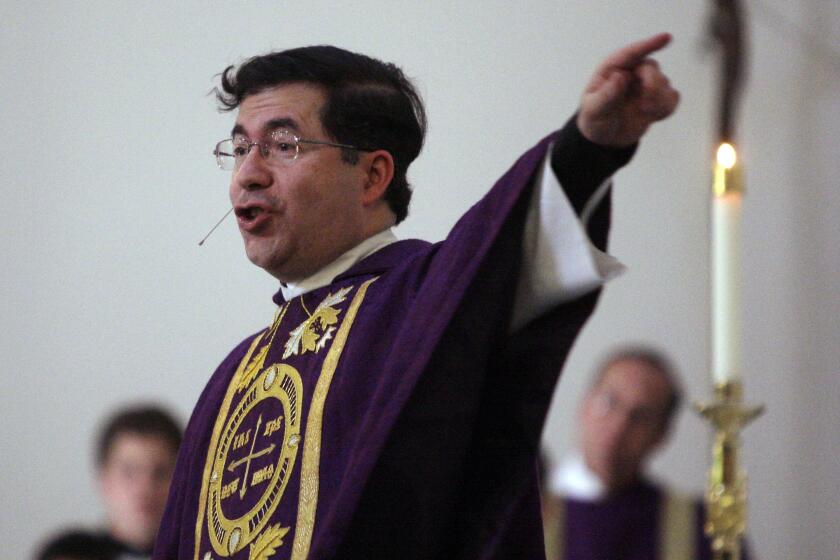Column: Is God on the side of blasphemy laws?

- Share via
It’s not nice to insult someone’s religion. It’s offensive to deny, denigrate or mock people’s gods or prophets, beliefs or rituals. I shouldn’t do it and neither should you.
But let’s say we do. We should not be imprisoned, lashed or put to death for it.
That seems like a pretty basic rule of thumb, built on established, widely accepted principles of human rights and freedom of expression.
But try telling that to officials in Pakistan, who in mid-April arrested a Chinese man working on a dam project and imprisoned him on charges of “blasphemy” for insulting God and the prophet Muhammad. If convicted, he could be sentenced to death.
Opinion Columnist
Nicholas Goldberg
Nicholas Goldberg served 11 years as editor of the editorial page and is a former editor of the Op-Ed page and Sunday Opinion section.
That sounds utterly crazy to me. But in Pakistan, a Muslim country that has been growing more deeply conservative and religious in recent years, it has long been the law.
Some reformers have sought to moderate that zeal. But instead, Pakistan recently toughened its rules.
Under a new law passed in January by the country’s National Assembly, if you’re deemed to have insulted the prophet’s wives or companions or close relations, you can be sentenced to 10 years in prison — with a possible extension to life in prison — and fined several thousand dollars. Bail is no longer an option. That goes well beyond what the previous statutes allowed for.
These draconian, anachronistic blasphemy laws have been used as a pretext to persecute Pakistan’s religious minorities, especially Christians. They’ve been used to settle personal disputes. They’ve gone hand in hand with vigilante justice. They’ve been wielded by politicians against their opponents.
Charges are rarely brought against foreigners, which is why attention is being paid to this latest arrest. The alleged blasphemer, identified only as Tian, is a transportation supervisor at the Dasu hydropower project, led by a Chinese engineering company.
Religion is often the pretext for laws like the new one in Pakistan, used by ruling powers to further their own agendas.
Tian allegedly made his insulting remarks and gestures while criticizing two workers for taking too long to pray, according to the Associated Press. Then a crowd of hundreds of local residents and workers rallied to demand his arrest.
Good luck to him is all I can say.
Also last month, Pakistani police arrested Sana Ullah in Punjab province on charges of blasphemy for claiming she was an Islamic prophet. She was taken into custody after a mob gathered outside her house demanding she be lynched, police said.
During the period from January 2014 to December 2018, Pakistan led all countries in enforcing laws against so-called blasphemers, bringing a total of 184 cases, according to a report by the United States Commission on International Religious Freedom. Although the state has not executed a person convicted under the blasphemy laws, some have spent years in prison, including in isolation.
But blasphemy laws are not just an issue in Pakistan. During the same period, Iran prosecuted 96 cases, Russia 58 and India 51.
The Vatican has defrocked U.S. priest Frank Pavone for what it said were ‘blasphemous communications on social media’ and ‘persistent disobedience.’
According to a Pew Research Center report released last year, 79 countries had laws on the books in 2019 prohibiting blasphemy — which Pew defined as “speech or actions considered to be contemptuous of God or of people or objects considered sacred” — and 22 had laws against “apostasy,” which is the act of abandoning one’s faith.
The laws are most common in the Middle East and North Africa, and punishments are toughest there and in Asia. But Pew found laws against blasphemy in all the regions of the world, including Europe and the Americas. (Obviously, enforcement and punishment varies widely by country; some blasphemy laws aren’t enforced at all.)
In recent years, some countries have sought to repackage their blasphemy laws as “hate speech” laws. That’s a marketing gimmick designed to reassure the rest of the world that, no, this is not ancient tribalistic repression and intolerance — it’s merely modern anti-bigotry that we all should support.
Don’t believe it. Flogging and imprisoning people who speak disrespectfully about religion is not a move toward tolerance.
Blasphemy has a long history going back to ancient Greece, and it was ferociously punished in the medieval world with mutilations, stoning and banishments. Jesus was tried and condemned for blasphemy.
Pakistani police arrest at least 50 suspects in the mob lynching of a man who was in custody on suspicion of committing blasphemy against Islam.
In modern times it began to fade of its own accord, but not everywhere. In the last 10 years, a number of countries have amended or added blasphemy laws, including Nepal, Morocco, Oman and Kazakhstan, according to the Commission on International Religious Freedom.
In 2018, just to give a sense of how the ancient concept is being retooled for the modern era, officials in Indonesia introduced a new smartphone app to make it easier for people to report cases of heresy, including blasphemy. Google accepted the app, but there was an outcry and the app was eventually removed.
Until well into the 20th century, blasphemy was punishable in the United States, though such laws seem in obvious conflict with the 1st Amendment of the Constitution.
These days, there are rising challenges in the U.S. to free speech rules, increasing censorship of controversial books in schools, and new laws governing what may be taught in class — such as the Republican-approved statutes in Florida restricting lessons on gender identity or those that smack of critical race theory.
But troubling as those moves are, we’re not even edging close to Pakistan’s level of intolerance.
It’s wrong to disrespect the beliefs of others. But there should be no law in any country against doing so.
Neither lashings nor executions will make believers out of dissenters.
More to Read
A cure for the common opinion
Get thought-provoking perspectives with our weekly newsletter.
You may occasionally receive promotional content from the Los Angeles Times.















